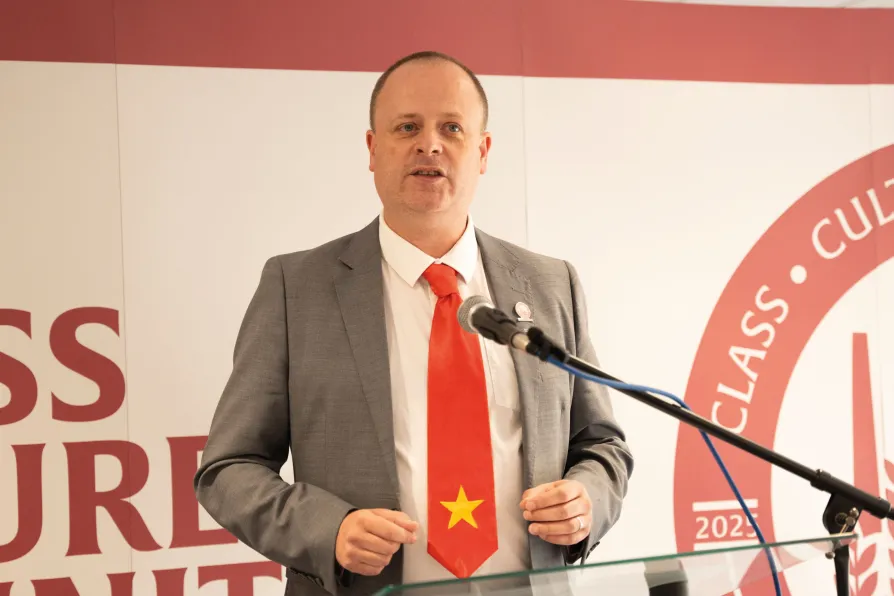The newly elected general secretary of the Aslef train drivers’ union speaks to Ben Chacko about union wins, a welcome shift in approach to the rail sector and what still needs to be done
With 90 courses from health and safety to neurodiversity, AI and political economy, we are helping workers understand the political context of their struggles, writes general secretary of the General Federation of Trade Unions GAWAIN LITTLE

 BUILDING SOLIDARITY: GFTU general secretary Gawain Little
BUILDING SOLIDARITY: GFTU general secretary Gawain Little
IN JULY of this year, at the 139th Durham Miners Gala, the General Federation of Trade Unions (GFTU) launched its biggest ever education programme.
With over 90 courses, covering everything from workplace reps and health and safety stage one and two to creative activism, lessons in organising and our brand-new trade union certificate in labour law and the labour movement, it is now one of the most extensive cross-union education programmes.
Right at the heart of this programme is solidarity. Like the very foundations of our trade union movement, solidarity runs through every aspect of our education programme, forming the solid rock on which it is built.
With the rise of far-right street violence, and our communities increasingly divided by the rhetoric of the far right and of populist right parties like Reform, there has never been a more important time to build solidarity — in our workplaces, in our communities, nationally and internationally.
This is why our courses focus on collective, not individual, solutions to the issues faced by working people. For example, our workplace reps courses identify the skills and approaches needed to empower workers to act collectively, rather than attempting to solve their problems for them, and our new branch officers development course integrates this into a wider framework of how we develop a layer of workplace reps and activists who can lead in this way.
Similarly, our courses on bargaining and organising for neurodiversity and bargaining, organising and campaigning around AI and data take a collective approach to these issues as whole-workplace issues, rather than just supporting individuals.
The same approach is taken to sexism and racism in our tackling sexual harassment and roots of racism courses, which situate oppression and discrimination in their wider class context, as well as offering concrete strategies for building anti-racist workplaces and a culture of challenging sexism and sexual harassment.
New to this year’s programme is a suite of courses on political economy. The first products of our collaboration with the economics department at Soas, University of London, these courses (including political economy for beginners, a politics and the economy school, a political economy conference and a series of international seminars on political economy) are designed to help workers understand the economic context within which we operate, again from the perspective of building solidarity.
The same theme of solidarity runs through our stage four courses — our trade union leadership and innovation programme (now on its third cohort) and our new trade union certificate in labour law and the labour movement.
This latter course, developed alongside the Institute of Employment Rights and the Birkbeck School of Law, is an in-depth overview of the state of labour law in this country, set in its political, historical and international context. Once again, the question of building solidarity, both in our use of labour law and in our fight to extend it, is to the fore.
Our focus on solidarity is an essential part of who we are as a trade union federation, and a response to the very real challenges of 2025, but it has also proved to be a real strength of our educational approach. Last year, 100 per cent of students agreed that the objectives of their course were met, with 67 per cent strongly agreeing.
Seven in 10 students said their confidence and leadership skills had developed as a result of their course, more than four in five said they felt better equipped to build change in their workplace and/or their union, and around two-thirds felt able to build sustainable change in their organisation or workplace, including building a workplace free from discrimination, bullying and harassment.
Most importantly, the feedback we get from unions whose members attend our courses is that we send back confident, well-trained reps and activists who go on to build the union and build collective power in the workplace.
That is one reason why the GFTU is a growing federation, with more affiliates joining us each year. It is also why we have opened up our education to the wider movement by developing a trade union education fund to support regions and branches of non-affiliated unions to access our education programme.
Building solidarity across our movement is also the reason that we have developed our trades councils education fund, to support the work of trade union councils, a crucial part of the trade union movement and an essential interface between trade unions and the local communities they are part of.
You can find out more about the trade union education fund and the trades councils education fund at www.gftuet.org.uk.
There has never been a better time to build your relationship with the General Federation of Trade Unions and, together, to build solidarity across our class.









